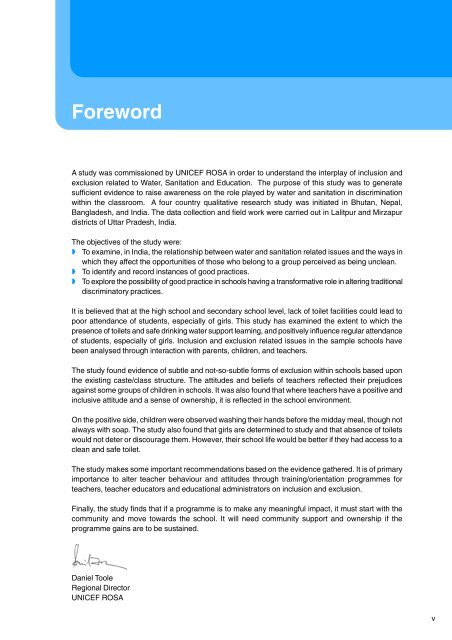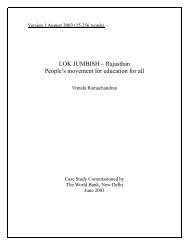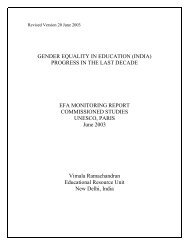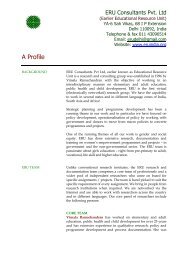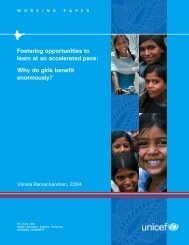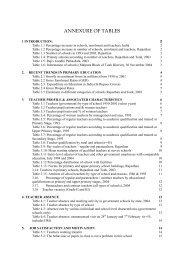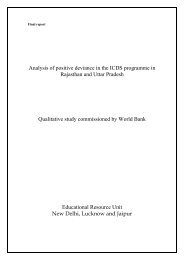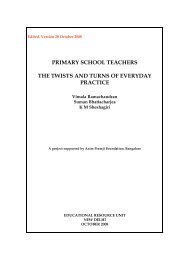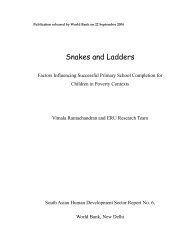Equity in School Water and Sanitation
Equity in School Water and Sanitation
Equity in School Water and Sanitation
Create successful ePaper yourself
Turn your PDF publications into a flip-book with our unique Google optimized e-Paper software.
Overcom<strong>in</strong>g Exclusion <strong>and</strong> Discrim<strong>in</strong>ation <strong>in</strong> South AsiaCountry Report BhutanForewordA study was commissioned by UNICEF ROSA <strong>in</strong> order to underst<strong>and</strong> the <strong>in</strong>terplay of <strong>in</strong>clusion <strong>and</strong>exclusion related to <strong>Water</strong>, <strong>Sanitation</strong> <strong>and</strong> Education. The purpose of this study was to generatesufficient evidence to raise awareness on the role played by water <strong>and</strong> sanitation <strong>in</strong> discrim<strong>in</strong>ationwith<strong>in</strong> the classroom. A four country qualitative research study was <strong>in</strong>itiated <strong>in</strong> Bhutan, Nepal,Bangladesh, <strong>and</strong> India. The data collection <strong>and</strong> field work were carried out <strong>in</strong> Lalitpur <strong>and</strong> Mirzapurdistricts of Uttar Pradesh, India.The objectives of the study were: To exam<strong>in</strong>e, <strong>in</strong> India, the relationship between water <strong>and</strong> sanitation related issues <strong>and</strong> the ways <strong>in</strong>which they affect the opportunities of those who belong to a group perceived as be<strong>in</strong>g unclean. To identify <strong>and</strong> record <strong>in</strong>stances of good practices. To explore the possibility of good practice <strong>in</strong> schools hav<strong>in</strong>g a transformative role <strong>in</strong> alter<strong>in</strong>g traditionaldiscrim<strong>in</strong>atory practices.It is believed that at the high school <strong>and</strong> secondary school level, lack of toilet facilities could lead topoor attendance of students, especially of girls. This study has exam<strong>in</strong>ed the extent to which thepresence of toilets <strong>and</strong> safe dr<strong>in</strong>k<strong>in</strong>g water support learn<strong>in</strong>g, <strong>and</strong> positively <strong>in</strong>fluence regular attendanceof students, especially of girls. Inclusion <strong>and</strong> exclusion related issues <strong>in</strong> the sample schools havebeen analysed through <strong>in</strong>teraction with parents, children, <strong>and</strong> teachers.The study found evidence of subtle <strong>and</strong> not-so-subtle forms of exclusion with<strong>in</strong> schools based uponthe exist<strong>in</strong>g caste/class structure. The attitudes <strong>and</strong> beliefs of teachers reflected their prejudicesaga<strong>in</strong>st some groups of children <strong>in</strong> schools. It was also found that where teachers have a positive <strong>and</strong><strong>in</strong>clusive attitude <strong>and</strong> a sense of ownership, it is reflected <strong>in</strong> the school environment.On the positive side, children were observed wash<strong>in</strong>g their h<strong>and</strong>s before the midday meal, though notalways with soap. The study also found that girls are determ<strong>in</strong>ed to study <strong>and</strong> that absence of toiletswould not deter or discourage them. However, their school life would be better if they had access to aclean <strong>and</strong> safe toilet.The study makes some important recommendations based on the evidence gathered. It is of primaryimportance to alter teacher behaviour <strong>and</strong> attitudes through tra<strong>in</strong><strong>in</strong>g/orientation programmes forteachers, teacher educators <strong>and</strong> educational adm<strong>in</strong>istrators on <strong>in</strong>clusion <strong>and</strong> exclusion.F<strong>in</strong>ally, the study f<strong>in</strong>ds that if a programme is to make any mean<strong>in</strong>gful impact, it must start with thecommunity <strong>and</strong> move towards the school. It will need community support <strong>and</strong> ownership if theprogramme ga<strong>in</strong>s are to be susta<strong>in</strong>ed.Daniel TooleRegional DirectorUNICEF ROSAv


